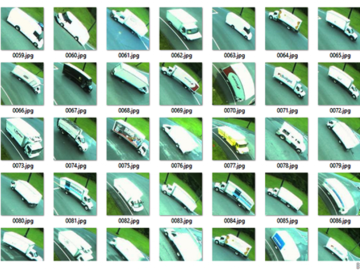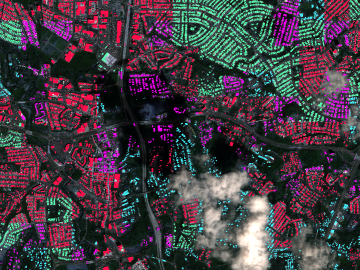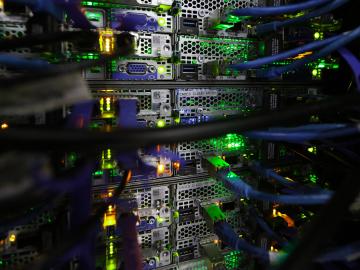
Filter News
Area of Research
- Advanced Manufacturing (8)
- Biological Systems (1)
- Biology and Environment (75)
- Biology and Soft Matter (1)
- Building Technologies (1)
- Computational Biology (2)
- Computational Engineering (3)
- Computer Science (17)
- Electricity and Smart Grid (1)
- Energy Science (86)
- Functional Materials for Energy (1)
- Fusion and Fission (27)
- Fusion Energy (15)
- Isotope Development and Production (1)
- Isotopes (9)
- Materials (119)
- Materials Characterization (1)
- Materials for Computing (19)
- Materials Under Extremes (1)
- Mathematics (1)
- National Security (33)
- Neutron Science (129)
- Nuclear Science and Technology (19)
- Quantum information Science (6)
- Sensors and Controls (1)
- Supercomputing (142)
- Transportation Systems (1)
News Topics
- (-) Artificial Intelligence (131)
- (-) Biomedical (73)
- (-) Computer Science (226)
- (-) Fusion (66)
- (-) Materials Science (158)
- (-) Neutron Science (171)
- (-) Security (31)
- (-) Summit (71)
- 3-D Printing/Advanced Manufacturing (146)
- Advanced Reactors (40)
- Big Data (79)
- Bioenergy (112)
- Biology (128)
- Biotechnology (39)
- Buildings (74)
- Chemical Sciences (86)
- Clean Water (33)
- Composites (35)
- Coronavirus (48)
- Critical Materials (29)
- Cybersecurity (35)
- Education (5)
- Element Discovery (1)
- Emergency (4)
- Energy Storage (114)
- Environment (218)
- Exascale Computing (67)
- Fossil Energy (8)
- Frontier (64)
- Grid (74)
- High-Performance Computing (130)
- Hydropower (12)
- Irradiation (3)
- Isotopes (62)
- ITER (9)
- Machine Learning (68)
- Materials (157)
- Mathematics (12)
- Mercury (12)
- Microelectronics (4)
- Microscopy (56)
- Molten Salt (10)
- Nanotechnology (64)
- National Security (86)
- Nuclear Energy (122)
- Partnerships (68)
- Physics (69)
- Polymers (35)
- Quantum Computing (53)
- Quantum Science (92)
- Simulation (65)
- Software (1)
- Space Exploration (26)
- Statistics (4)
- Transportation (103)
Media Contacts

We have a data problem. Humanity is now generating more data than it can handle; more sensors, smartphones, and devices of all types are coming online every day and contributing to the ever-growing global dataset.

Each year, approximately 6 billion gallons of fuel are wasted as vehicles wait at stop lights or sit in dense traffic with engines idling, according to US Department of Energy estimates.

OAK RIDGE, Tenn., Feb. 12, 2020 -- Michael Brady, a researcher at the Department of Energy’s Oak Ridge National Laboratory, has been named fellow of the National Association of Corrosion Engineers, or NACE International.

As the second-leading cause of death in the United States, cancer is a public health crisis that afflicts nearly one in two people during their lifetime.
A team of scientists led by Oak Ridge National Laboratory found that while all regions of the country can expect an earlier start to the growing season as temperatures rise, the trend is likely to become more variable year-over-year in hotter regions.

A novel approach developed by scientists at ORNL can scan massive datasets of large-scale satellite images to more accurately map infrastructure – such as buildings and roads – in hours versus days.

Oak Ridge National Laboratory will partner with Cincinnati Children’s Hospital Medical Center to explore ways to deploy expertise in health data science that could more quickly identify patients’ mental health risk factors and aid in

The prospect of simulating a fusion plasma is a step closer to reality thanks to a new computational tool developed by scientists in fusion physics, computer science and mathematics at ORNL.

An international team of researchers has discovered the hydrogen atoms in a metal hydride material are much more tightly spaced than had been predicted for decades — a feature that could possibly facilitate superconductivity at or near room temperature and pressure.

The formation of lithium dendrites is still a mystery, but materials engineers study the conditions that enable dendrites and how to stop them.


